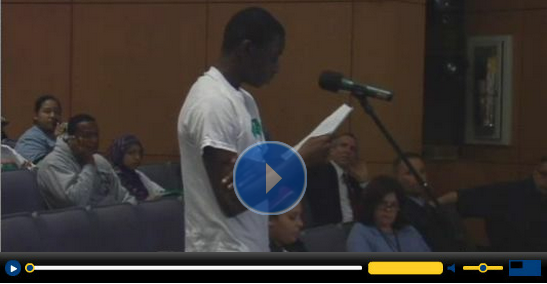Suspensions To Decrease Under Revised DOE Discipline Code
Resource type: News
By Lindsey Christ
A public meeting was held in Lower Manhattan Tuesday night about proposed changes to the Department of Education’s discipline code, as the department’s statistics show that 73,000 suspensions occurred in city public schools last year. NY1’s Educational reporter Lindsey Christ filed the following report.
City students were suspended from school more than 73,000 times last year and advocates say it almost always does more harm than good.
Now the Department of Education is trying to cut down on suspensions by revising the student discipline code, and a public meeting on those revisions was held in Lower Manhattan on Tuesday night.
The changes include taking away principals’ ability to suspend students for a host of minor infractions, like swearing, gambling or using the Internet for non-educational purposes.
Under the current discipline code, those behaviors can get students kicked out of school for up to five days, starting in kindergarten.
“This has been years and years in the making and I think it is one of the smaller steps they could take,” said Samantha Pownall of the New York Civil Liberties Union.
Educators are now being encouraged to use alternate punishments and positive approaches to change students’ behavior
At the Tuesday meeting, students told personal stories about the effects of suspension.
“You miss out a certain amount of instructional days that you can never get back at all,” said one student. “We got suspended for just wearing a hat.”
“My brother got into a shouting match because somebody skipped him in the lunch room and I guess they said something. He got into a shouting match, he got suspended for two weeks,” said another. “And my brother after that, he just started getting suspended. He started cutting school and now he just dropped out. Sixteen and not going to school any more because he just felt like he was getting suspended for everything.”
Some advocates said the DOE’s changes do not go nearly far enough.
“There are still 25 infractions in the discipline code that students can get suspended for up to a full academic year and there are also many more suspension that you can get for five days, 10 days,” said Liz Sullivan of the National Economic and Social Rights Initiative.
Still, at least one teacher said sometimes disruptive students need to be removed, as long as schools are able to help them get back on track.
“Whatever they’re doing at the time of their disruption is a cry for help. And when that child is removed, if they actually don’t get that help, they come back to you with those same problems,” said Marion Bell, a teacher. “There is no blame except we don’t really have the resources, we don’t really have the personnel and oftentimes, we don’t have the resources and adequate training.”
It is one thing that almost everyone who attended the meeting seemed to agree on, that while changing the discipline code is important, the funding and training that needs to accompany those changes is equally, if not more, important.
New York Civil Liberties Union and National Economic and Social Rights Initiative are Atlantic grantees.
